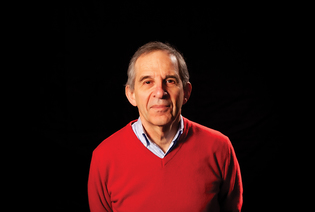
Dan Renzetti
Applied physics professor Michel Devoret is cowinner of the Micius Quantum Prize.
View full image
For 40 years, Michel Devoret, the Frederick W. Beinecke Professor of Applied Physics, has been building artificial atoms. The work began during his postdoc at the University of California–Berkeley in the early 1980s. It continued through his tenure at the Commissariat à l’Energie Atomique in France and into his time at Yale, where he joined the faculty in 2002.
In recognition of this work, Devoret, 69, is corecipient of the 2021 Micius Quantum Prize, which honors significant advances in quantum science. He shares the $150,000 prize with John Clarke, his former adviser at Berkeley, and Yasunobu Nakamura of the University of Tokyo.
“In the popular imagination, a simple quantum system is associated with the very small dimensions of atoms,” Devoret says. Individual atoms with their orbiting electrons, for instance, behave according to the predictions of quantum mechanics. But Devoret’s artificial atom—originally made with the metals niobium, lead, and indium, and now with aluminum—is actually millions of times larger than actual atoms, while still obeying quantum principles. “The fact that this artificial atom is both a quantum object and an electrical element, that can be measured by attaching wires to it, is the discovery and the invention that is being recognized,” he says.
Devoret’s work is central to the rapidly expanding field of quantum computing, which promises to harness the uncertainty inherent in quantum mechanics to create computers with vastly more computational power than today’s conventional processors. And while quantum computers can be constructed using natural atoms, those atoms must be held in place by lasers in a vacuum, “which is quite inconvenient,” Devoret says. Artificial atoms work like conventional circuits; they don’t require radically new manufacturing lines for commercialization.
Devoret has a hunch that the rise of quantum computing and its rapidly growing industry are partly responsible for the timing of the prize. But the email from the Micius Foundation took him by surprise, and in discussing its implications, he remains charmingly humble.
“You do the best work that you can. The results of that work have to be true, novel, and meaningful,” he says. “But this is not something I would have predicted in 1985. You don’t control your legacy.”
 loading
loading